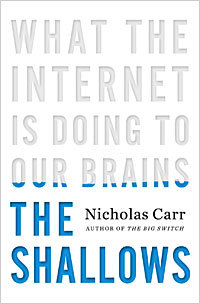 | |
| Author | Nicholas G. Carr |
|---|---|
| Language | English |
| Publisher | W. W. Norton & Company |
Publication date | 2010 |
| Media type | Print (Hardback) |
| Pages | 280 |
| ISBN | 978-0-393-33975-8 |
The Shallows: What the Internet Is Doing to Our Brains, published in the United Kingdom as The Shallows: How the Internet Is Changing the Way We Think, Read and Remember, is a 2010 book by the American journalist Nicholas G. Carr. Published by W. W. Norton & Company, the book expands on the themes first raised in "Is Google Making Us Stupid?", Carr's 2008 essay in The Atlantic , and explores the effects of the Internet on the brain. The book claims research shows "online reading" yields lower comprehension than reading a printed page. [1] The Shallows was a finalist for the 2011 Pulitzer Prize in General Nonfiction. [2] [3]